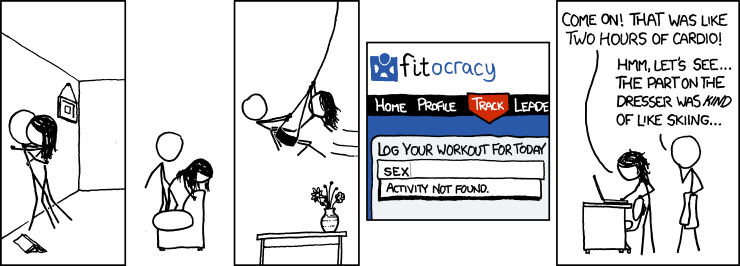
according to the hover over text in the last frame of this cartoon (called Oversight)
"I felt so clever when I found a way to game the Fitocracy system by incorporating a set of easy but high scoring activities into my regular schedule. Took me a bit to realize I'd been tricked into setting up a daily exercise routine"
Systems that motivate
I have also been taken in to play the game on a UK running website called FetchEveryone. Fetch (as it is known to its users) allows you to log your runs and provides quite detailed analysis of your performance (all dynamically calculated from your data). It compares your race performance with national standards, and applies known reckoning methods to predict performance in future races.
Early additions included adding a personal annual challenge and generating league tables against the target. Then, noting that folk tended to set challenges (particularly of the do something every day for a month - in running terms known as streaking, and typcially titled something like AugustAthon, MayAthon (or whatever month you choose) it established a feedback grid called a ThingyThon.
It also introduced a game called Conquercise, which is a Foursquare or Gowalla for runners, allowing them to 'conquer' areas as a result of being the person who covered a particular grid square the most frequently.

One of the aspect of learning (which is related to motivation) is time spent on task. All of the examples above reward people for spending more time on task. The reward is personal, but the recognition and status is within the community.
This reward for persistent behaviour is a factor which runs as a thread in various commentaries on social media - for example Charles Leadbeater's We Think, and Clay Shirky's Cognitive Surplus.Pervasive monitoring
For exercise activities various pervasive monitors have emerged which take some of the over the tasks of data collection.
Fitbug is another example of such a system - a glorified pedometer from which to upload data, ie designed for a specific purpose, this time using a subscription model (perhaps further motivation??) and running a closed system - although it does incorporate league tables (a fantasy footfall league!). Fitbit is more sophisticated measuring activity levels with a 3d motion detecter. It only available in the US but lets you choose between subscription and free use plus it is making its API available for interface with other apps (although data download is only available with the subscription model).
Systems such as Fetch allow you to submit data collected automatically by specialist devices such as heart monitors and GPS tracking systems. It appears, superficially, that folk who are able to submit such data are more persistent in their updates, and perhaps, more persistent in their commitment to exercise. That is certainly the claim which is made for the Fitbug.
Games with a purpose
Games with a purpose have a long history. According to The British Library the first jigsaw puzzles were devised by John Spilsbury to help teach geography (1776) , make a map of the worlds and you kind of get familiar with the different countries, towns and where they all are.
Monitoring for learning
I am particularly interested in the way in which social software is being harnessed to reinforce behaviours. My thinking is that this might be extended to motivating time on task for our undergraduate students. I am not aware of any other systems which are currently operating along these lines.
My challenge is to work out how to devise a game which would be appropriately motivating, and how create a closed and trusting community which would enable personal data to be aggregated for individual and group advantage. My thinking is that students themselves are likely to be the best people to design such a system, using their understandings to build something which is appealing and purposeful.
In many ways a good system would provide data which could be examined to provide guidance for subsequent learners addressing similar tasks. The Fetch system administrator performs and publishes this type of analysis and distributes the findings in regular newsletters - an example them of citizen science which is gathering data on a larger scale and from larger cohorts than is often available for academic sports scientists.
Using tracking derived from Educational administration and infrastructure might provide some of the means by which we could allow learners to submit data automatically to an educational version of Fetch.
Links
- Charles Leadbeater http://www.charlesleadbeater.net/
- Clay Shirky http://www.shirky.com/
- FetchEveryone http://www.fetcheveryone.com/
- Fitbit http://www.fitbit.com/
- Fitbug http://www.fitbug.com/
- Fitocracy http://www.fitocracy.com/
- The British Library, Learning: mapping minds, http://www.bl.uk/learning/artimages/maphist/minds/jigsawpuzzle/jigsawpuzzle1766.html
- xlcd Oversight http://xkcd.com/940/





No comments:
Post a Comment